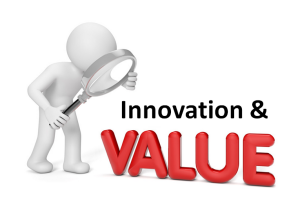 Innovation needs to create value, both short-term and progressively over time. It fuels the growth and fires the imagination.
Innovation needs to create value, both short-term and progressively over time. It fuels the growth and fires the imagination.
Yet our innovation activities are constantly coming up short for the leaders within our organizations, who continue to remain disappointed in its final outcome to stimulate and drive the growth they want to see.
It is actually the classic “chicken and egg”. Aristotle (384–322 BC) was puzzled by the idea that there could be a first bird or egg and concluded that both the bird and egg must have always existed. Leaders need to lead and are they the chicken, they are the resource for how can the people charged with innovation can lay the ‘golden eggs’ needed, if they are incapable of laying? Or should the innovation egg come first for our leaders to become more confident and build further, believing in innovation far more?
There should be no dilemma we can’t treat innovation lightly anymore, it needs to develop its uniqueness for each of our organizations to evolve. We need both the egg and the chicken to be ‘producing’.
What I’m driving towards here is that innovation is evolving is my 1st point
value creation
The ongoing challenge is making change our constant
 Thinking about the managing of change has been occupying my mind in recent weeks. It will continue into the next few weeks as Jeffrey Phillips of OVO Innovation and I have co-authored a White Paper called “the critical interplay among innovation, business models and change” as it rolls out.
Thinking about the managing of change has been occupying my mind in recent weeks. It will continue into the next few weeks as Jeffrey Phillips of OVO Innovation and I have co-authored a White Paper called “the critical interplay among innovation, business models and change” as it rolls out.
In this we provide a foundation document that highlights the important interplay between innovation, business models and change. To launch this, we have kicked off our thinking with a feature of the week on Innovation Excellence introducing the themes that have multiple interplays we often fail to exploit when it comes to innovation.
The opening post is entitled “the interplay surrounding innovation”. Please take a read
Our opening argument revolves around the recognition of change as part of an interplay
We argue that we are failing to manage the different and multiple interplays that are constantly taking place when innovation occurs. We are often ignoring them and failing to extract the best or optimal value out of the innovation we are introducing. The change effect is often being ignored.
Where innovation value resides
Often surveys and reports catch you by surprise. I’ve been working through the Imaginatik Global Report called “The State of Global Innovation for 2013” and certain parts did exactly that. The sheer difficulties that organizations seem to have to quantify the benefits and value achieved through innovation worries me.
I had previously provided a review more on the Strategic and readiness part of the Imaginatik report, in my post “The coming age of innovation in 2014 and beyond” and less so on the other part discussed, the Process and Execution part.
It is the process and execution side that have more of the deeper issues to tackle and more importantly, the one’s that take considerable time if you are tacking culture and the environment to allow for innovation. They are far more complicated to provide answers too. I feel like pushing this along, here goes:
Shifting attitudes, think responsibly.
 How do we engage within our own internal organizational communities to shifting attitudes and think in different, more responsible ways? How do we communicate our sense of purpose to the outside world? How do we integrate all the activities we are (or should be) undertaking as responsible leaders?
How do we engage within our own internal organizational communities to shifting attitudes and think in different, more responsible ways? How do we communicate our sense of purpose to the outside world? How do we integrate all the activities we are (or should be) undertaking as responsible leaders?
Are we working towards understanding the material sustainability issues better and linking them to financial drivers and where we fit within these complex issues?
There is such an increasing need to develop or simply updating our business language to build stronger cases for change, improvement and broader community engagement but these still seem to be missing.
How are organizations aligning their organizations not just with their own strategies but those in the wider world that contribute into a more sustaining future? We are needing to answer a fair few of these questions in my opinion.
The lack of engagement, of common understanding
Value realization comes through innovation and our business models.
Everything, it seems we work towards in business, is for seeking out new value creation, for new growth and wealth creation, for providing improved returns on the investments we have been making and this is where innovation becomes so important.
To achieve this we consciously have to set about the value capture and what contributes to its realization. This is where innovation plays such a vital part. If we don’t build our innovation capital we will certainly have a much harder, perhaps even impossible time of realizing new value.
We are more than likely to just maintain our existing value or see it steadily decline. So a constant focus upon renewal is always needed. Do we consciously do that on a daily basis or just once a year at annual review time?
Value-adding activities need to be central in nearly all of our decisions. The how we can turn our resources into being more productive, more creative is increasingly becoming one our biggest strategic areas of future investment decision.
Our resources are those all-inclusive assets, capabilities and processes that make up the Enterprise.
The importance of managing our intangible capital is the key for today’s innovating business.
Today, we are valuing organizations in completely different ways than some years back as intangible capital grows in importance. In the past we were valuing organizations purely on their tangible assets, the ‘hard’ (easier to) quantify assets, shown on the balance sheets as the basis for the value of the organization.
Today that is not the case; it is more the off-balance-sheet bound up in networks, relationships, connections and the ability to manage the fluidity that is occurring constantly around us, and the organization’s ability to respond appropriately in seeking out improved, new value through better innovative offerings.
Intangibles are providing the new value system equation to focus upon